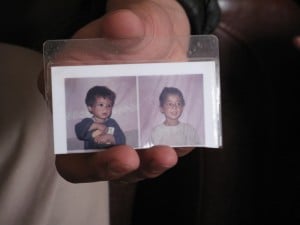 I’m sitting with the father of a young boy killed in a firefight in Afghanistan. His child was eight years old. He told me his story:
I’m sitting with the father of a young boy killed in a firefight in Afghanistan. His child was eight years old. He told me his story:
Just before dawn on February 8th, helicopters carrying dozens of French and Afghan troops landed in a remote village in Kapisa province located in northeastern Afghanistan. The soldiers searched the villagers’ homes, reportedly looking for weapons caches. Several hours later, a group of young boys were out herding cattle nearby when the commander of the ground operation called in an airstrike. The boys had stopped to light a fire to keep warm from the brutal Afghan winter temperatures when the bombs struck them. All of the eight boys, who were as young as eight years old and no older than eighteen, were killed.
Abdul only broke his stoic appearance once during our interview to fight back tears. His account of the details of the incident was clinical, but Abdul’s emotions emerged when I asked about his son. “He was a very kind person…my heart is broken,” he said. Aja Mal—Abdul’s son—liked school, and aspired to study in Europe or the United States.
According to Abdul, three generals from the US-led security assistance force (ISAF) came to his village to express their condolences several days after the tragic event. The US, British, and French Generals told him and the other villagers that they didn’t intend to kill the boys, and promised to compensate those who had lost their loved ones. A week later, ISAF’s top commander, General John Allen, expressed his “sincere condolences” and affirmed that ISAF will continue to do everything possible to “ensure the safety of the Afghan population.” To date, Abdul has not received any compensation or assistance for the death of his son.
When I asked Abdul what he wants from ISAF, he was firm but fair. He is willing to accept ISAF’s condolences, provided it is followed by the financial compensation or assistance promised to him by the Generals that visited his village. “In Afghanistan, if someone comes to your home [to apologize] you do not get revenge on them,” he explained. “But we also request them to help the families of those killed…If they don’t help our families, we take it as a sign that they did this intentionally. And then people will raise their guns to fight them.”
An Afghan police officer working alongside international forces, Abdul offers an interesting perspective given reports of distrust and outright animosity between international and Afghan forces. “I told them [ISAF], you are our mentors. As long as you [make] such big mistakes, how can you train our forces to be good professionals and to help our country?” Abdul noted.
Abdul echoes the sentiments of other Afghans I have spoken with, who are understandably upset with the increasing rate of civilian deaths in Afghanistan. Even while the vast majority of civilian casualties are caused by insurgents, many Afghans think ISAF should be doing more to prevent civilian harm, and are more critical when international forces kill civilians – even if by mistake.
While ISAF officials were quick to express their regrets in the wake of the Kapisa incident, the international force is still not certain their actions killed the boys. According to ISAF, a secret informant told coalition forces that insurgents were planning to attack the French and Afghan troops in Kapisa. Through binoculars and other “optical equipment,” the troops claim to have spotted “adult sized” men carrying weapons and moving in a tactical fashion. The French forces on the ground reportedly attacked the insurgents, which was followed by an air strike ordered by the ground commander. After the engagement, ISAF reports that the French troops found the young boys amongst other dead bodies, but are still not certain who is to blame for their deaths.
It has now been three weeks since Aja Mal and the other boys were killed. Still, the families of those killed have not received anything from ISAF beyond spoken condolences. Unfortunately, the disparate narratives of the incident leave me cynical about whether Abdul or any of the other families will receive compensation from ISAF. CIVIC’s past research has found that ISAF often does not compensate individuals killed or injured in “hard cases,” where it is not clear that international forces are to blame or where ISAF is not convinced those killed were civilians. The reason is that compensation is often perceived as an admission of fault or responsibility.
Yet, in these so-called “hard cases,” ISAF may gain more by simply providing timely compensation. Fact-finding is incredibly difficult in war zones, and many times investigations will not be determinative in establishing the truth. Waiting for a long drawn-out investigation to finish may anger or alienate the victims, and undermine the positive impact of any compensation eventually issued.
Ex gratia (meaning “by favor” and thus not obligatory) payments need not necessarily be an admission of fault or responsibility. While questions remain over exactly what happened in the Kapisa incident, ISAF is better off making a judgment call and issuing timely compensation to the families of those killed. The ages of these young boys lead me to doubt that they were belligerents. Even if international forces were not responsible for the boys’ deaths, compensation would be an expression of good will. It could also help mitigate tensions amongst Afghans – whom have already decided that ISAF is to blame for the incident – and ensure that Abdul and the other families are compensated for their tragic loss.
This post originally appeared on CIVIC From the Field
Photo courtesy of Erica Gaston/OSI